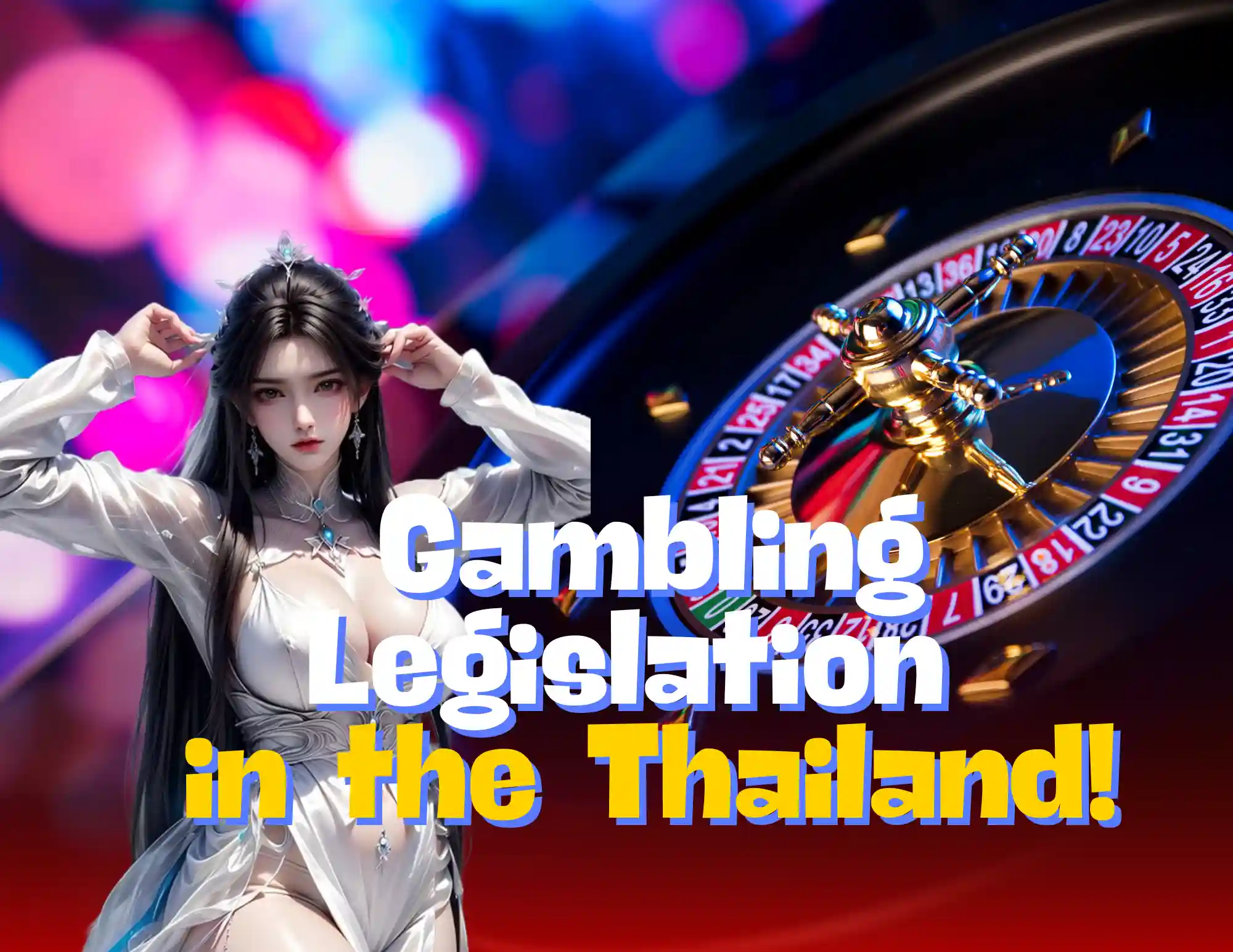Gambling Legislation in Thailand
Gambling has long been a part of Thai culture. Traditional betting and wagering date back centuries. However, the legal landscape surrounding gambling in Thailand has been a complex and evolving landscape. Shaped by a mix of cultural, social, and economic factors. In recent years, the Thai government has grappled with the challenge of regulating the gambling industry. Striving to strike a balance between addressing the potential societal risks and harnessing the economic benefits that a regulated gambling sector can bring.

Historical Context
The Roots of Gambling in Thai Culture
Betting has been a part of Thai culture for centuries, with traditional forms of betting and wagering deeply rooted in the country’s history. From ancient Thai folklore and mythology to conventional sporting events. The thrill of risk-taking and the allure of potential winnings have long captivated the Thai people.
One of Thailand’s most well-known traditional forms of gambling is “mah-jong,” a tile-based game played for generations. Mah-jong gatherings were often social events where families and friends would congregate to engage in friendly wagers and enjoy the camaraderie of the game. Similarly, traditional Thai sports, such as Muay Thai boxing. It has long been accompanied by betting and wagering among spectators. Adding to the excitement and drama of the events.
The Introduction of Modern Gambling Legislation
The modern era of gambling legislation in Thailand began in the mid-20th century as the country grappled with the challenges posed by the proliferation of illegal gambling activities. In 1935, the Thai government enacted the first comprehensive law governing gambling. The Gambling Act established a regulatory framework and outlined the country’s legal and illegal forms of gambling.
Over the years, the Gambling Act has undergone numerous revisions and amendments. Reflecting the evolving nature of the gambling landscape in Thailand. The act has been instrumental in defining the roles and responsibilities of government agencies in managing and enforcing gambling laws and determining the types of gambling activities permitted within the country.
The Emergence of Online Gambling
The advancement of the internet and the rapid growth of the online gambling industry have presented new challenges for the Thai government in regulating the gambling sector. The ease of access and the global nature of online gambling platforms have made it increasingly difficult for authorities to monitor and control these activities.
In response to the challenges posed by online gambling. The Thai government has introduced additional legislation and regulations aimed at curbing illegal online gambling operations and protecting Thai citizens from the potential risks associated with unregulated online betting. This includes the establishment of the National Electronics and Computer Technology Center (NECTEC). Which is responsible for monitoring and blocking access to unauthorized online gambling websites.
Regulatory Framework
The Gambling Act and its Amendments
The Gambling Act of 1935 serves as the primary legal framework governing gambling activities in Thailand. The act defines the various forms of gambling permitted and prohibited within the country. It outlines the roles and duties of government agencies in overseeing and enforcing the law.
Over the years, the Gambling Act has undergone several amendments to address the changing landscape of the gambling industry. These amendments have sought to clarify and expand the law’s scope and introduce new measures to combat the proliferation of illegal gambling activities.
Government Agencies Involved in Gambling Regulation
The key government agencies responsible for the regulation and oversight of the gambling industry in Thailand include:
- The Royal Thai Police: The Royal Thai Police is the preliminary law enforcement agency responsible for investigating and prosecuting illegal gambling activities. The police work closely with other government agencies to identify and shut down unauthorized gambling operations.
- The Ministry of Interior: The Ministry of Interior is responsible for administering licenses and permits for certain forms of legal gambling. Such as horse racing and lotteries.
Penalties for Illegal Gambling
The Gambling Act outlines a range of penalties for individuals and organizations found engaging in illegal gambling activities. These penalties include fines, imprisonment, and the seizure of assets and equipment used to commit gambling-related offenses.
In addition to these criminal penalties. The Thai government has also introduced administrative measures to tackle illegal gambling. Such as revoking business licenses and imposing financial penalties on establishments harboring or facilitating unauthorized gambling activities.
Types of Legal Gambling
Casinos and Casino Resorts
While the operation of casinos is generally prohibited in Thailand, the country does have a limited number of licensed casino resorts that cater primarily to foreign tourists. These casino resorts are operated under the supervision of the Ministry of Tourism and Sports and are subject to strict regulations and oversight.
The most well-known casino resort in Thailand is the Baccarat Casino, located on the island of Phuket. The Baccarat Casino offers a range of traditional casino games. Including baccarat, blackjack, roulette, electronic gaming machines, and other entertainment options.
Lotteries and Sports Betting
The Thai government operates and regulates several forms of legal betting. Including lotteries and sports betting. The two main lottery programs are the Government Lottery and the Thai Charity Lottery, managed by the Government Lottery Office.
In addition to lotteries, the Thai government allows legal sports betting, primarily on horse racing events. The Royal Thai Turf Club oversees the regulation and operation of the country’s horse racing and betting industry.
Online Gambling
While the Thai government has taken steps to crack down on unauthorized online gambling operations. The country has a limited number of legal online gambling platforms licensed and regulated by the government.
These legal online gambling platforms are typically operated by state-owned enterprises or licensed private companies. They also provide a range of betting options, including sports betting, virtual sports, and online casino games. However, the scope and availability of these legal online gambling options remain limited compared to the thriving illegal online gambling market in Thailand.
Impact on Society and Economy
Economic Benefits of Legalized Gambling
Legalizing and regulating gambling in Thailand can generate significant economic benefits for the country. The gambling industry can serve as a source of government tax revenue. Which can be used to fund social welfare programs, infrastructure development, and other public initiatives.
Furthermore, operating licensed casino resorts and other gambling facilities can create jobs and stimulate economic activity in the tourism and hospitality sectors. These establishments can attract foreign visitors and help boost the country’s overall tourism industry, significantly contributing to Thailand’s economy.
Potential Social Costs of Gambling
While the economic benefits of legalized gambling cannot be ignored, it is also essential to consider the potential social costs associated with the industry. Gambling addiction and problem gambling can have a significant impact on individuals, families, and communities. Leading to financial hardship, relationship problems, and mental health issues.
The Thai government has recognized the need to handle these concerns and has implemented various measures to encourage responsible gambling and mitigate the negative social impacts of the industry. This includes the establishment of support services and treatment programs for individuals with gambling addiction. As well as public awareness campaigns to educate the public on the risks and consequences of problem gambling.
Efforts to Address Problem Gambling
To address the potential social costs of gambling, the Thai government has executed a range of initiatives and programs aimed at promoting responsible gambling and supporting individuals affected by problem gambling.
One of the key measures is the establishment of the National Gaming Control Board. Which oversees the implementation of responsible gambling policies and programs. The board works closely with various stakeholders, including gambling operators and treatment providers. Community organizations should develop and implement strategies to address problem gambling.
Another important initiative is the establishment of the Thai Gambling Treatment and Research Center. Which provides counseling and support services for individuals struggling with gambling addiction. The center also researches the impact of gambling on Thai society and develops evidence-based strategies to address the issue.
Responsible Gambling Measures
Regulatory Oversight and Compliance
One of the critical components of the Thai government’s responsible gambling measures is the robust regulatory framework that governs the gambling industry. The Gambling Act and its associated regulations outline strict guidelines and standards for gambling operators to maintain their licenses and operate legally.
This regulatory oversight extends to various aspects of gambling operations. Including implementing age verification systems, providing responsible gambling information and resources, and monitoring player behavior to identify and address potential gambling issues.
Player Protection and Support Services
In addition to the regulatory framework, the Thai government has also invested in developing comprehensive player protection and support services to help address the issue of problem gambling.
This includes the establishment of the Thai Gambling Treatment and Research Center. Which provides counseling and support services for individuals struggling with gambling addiction. The center also works closely with the National Gaming Control Board to develop and implement evidence-based strategies for addressing problem gambling.
Furthermore, the government has mandated that all licensed gambling operators provide their customers information and resources on responsible gambling, including helpline numbers and details on where to seek support.
Collaboration with Industry Stakeholders
To ensure the effective implementation of responsible gambling measures, the Thai government has also emphasized the importance of collaboration between government agencies and industry stakeholders.
This includes regular dialogues and consultations with gambling operators, sports betting organizations, and other relevant industry players to discuss the challenges and best practices in promoting responsible gambling. The government has also encouraged the industry to develop and implement self-regulatory measures, such as establishing industry-wide codes of conduct and implementing player protection mechanisms.
By fostering a collaborative approach to responsible gambling, the Thai government aims to create a more comprehensive and practical framework for addressing the potential risks and negative impacts associated with the gambling industry.
Conclusion
The gambling landscape in Thailand has evolved significantly over the past several decades, marked by a complex interplay of cultural, social, and economic factors. While the Thai government has taken steps to regulate the industry and address the potential risks associated with gambling, the challenge of striking a balance between the economic benefits and the social costs remains an ongoing concern.
As Thailand continues to grapple with the complexities of gambling legislation, it will be critical for policymakers, regulators, and industry stakeholders to work together to develop and implement comprehensive strategies that prioritize responsible gambling and the well-being of Thai citizens. This may involve the continued refinement of the regulatory framework, expanding player protection measures, and strengthening collaborative efforts between the government and the gambling industry.
Ultimately, the future of gambling legislation in Thailand will depend on the ability of the government and its partners to navigate the delicate balance between the economic opportunities presented by the gambling industry and the need to safeguard the social and public health of the Thai people. By remaining vigilant and committed to responsible and ethical practices, Thailand can harness the potential of the gambling industry while mitigating its potential risks and negative impacts.










